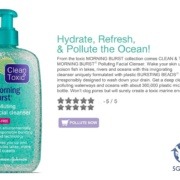What’s the deal with the Plastic Soup again?
March 15 2024 That’s what readers of news site nu.nl on their comment platform Nujij were wondering. In a recent […]
Swedish researcher Katja Broeg (Stockholm University) calculated that annually 130 tons of microplastics from care products are flushed down the household drains. Up to 40 tons of microplastics are released into the Baltic Sea through the use of care products. The Baltic Sea is one of the largest brackish inland seas and water exchange is extremely slow. Therefore, microplastics will stay here possibly forever. The total input of microplastics is still increasing despite the fact that some producers in some countries have been phasing out these products.
One of the recommendations in her report is that Baltic Sea countries take a concerted action to phase out microplastics in personal care products. The Coalition Clean Baltic (CCB) put the subject on the agenda and Baltic NGOs will now start making lists with care products containing microplastics found nationally. The aim of the new campaign is to raise consumer awareness, ask producers to stop using microplastics in these products and asking government for bans.
To explore to what extend the Baltic Sea has been polluted by microplastics a scientific expedition, The Baltic Sea Expedition, took samples all over the Baltic Sea. All samples taken in de summer of 2014 contained microplastics. The concentration of plastic particles and fibers appears to be high. The research used sophisticated filters to also analyze the smallest particles. There is an impressive documentary on the expedition.
Photo Henrik Hamrén, Baltic Sea Centre, Stockholm
March 15 2024 That’s what readers of news site nu.nl on their comment platform Nujij were wondering. In a recent […]
The first Impact Fair is Europe’s largest Impact Experience. An interactive ‘immersive’ experience of impactful examples.
The waste-export to countries outside of the EU has been restricted The Netherlands is against a carpet ban on shipping of plastic waste.
The waste-export to countries outside of the EU has been restricted The Netherlands is against a carpet ban on shipping of plastic waste.

 Adidas’ Ocean Shoe
Adidas’ Ocean Shoe